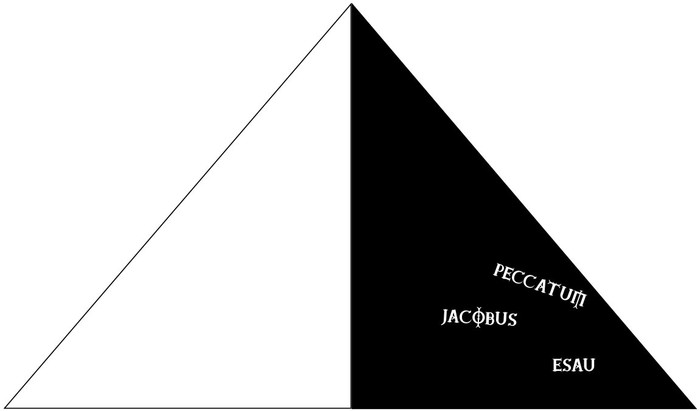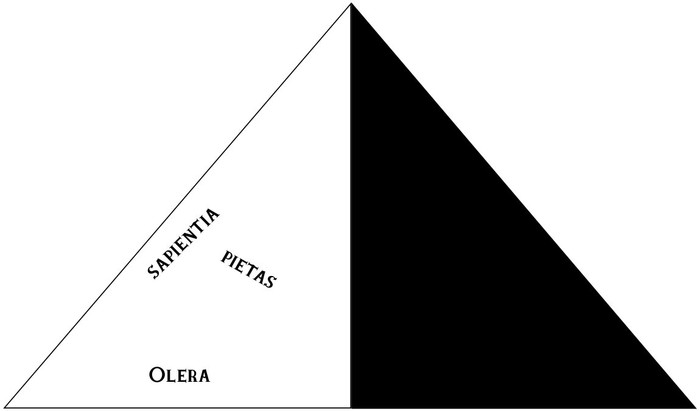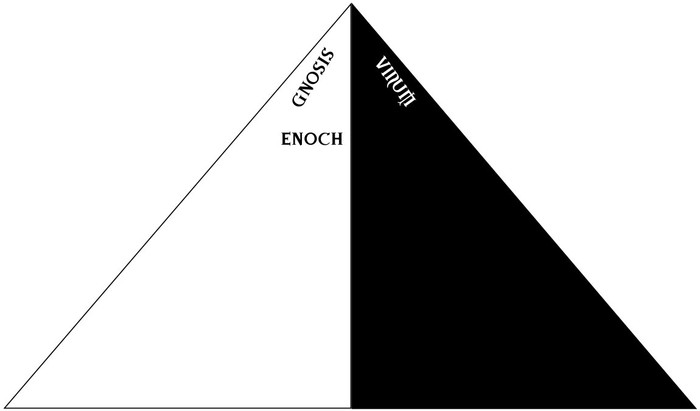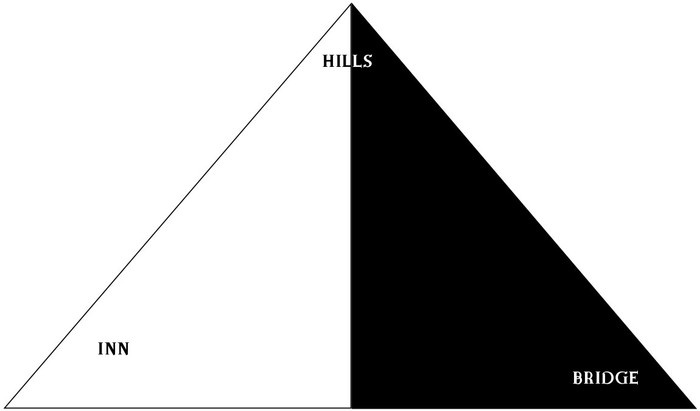The Book of Q (50 page)
Those in the “light” represented the good—the prophets, fruit, wisdom, gnosis. Those in the “darkness,” evil—brothers in conflict, meat, sin, nothingness. A child’s guide to the two realms of the universe.
What Pearse saw, however, astounded him. Half of the words in the triangle coincided exactly with the phrases from the Ribadeneyra entries. It was only their location that puzzled him.
“Hand me my pack,” he said to Petra, his eyes still glued to the page. Ivo quickly leaned forward and picked up the pack; he wasn’t quite strong enough to lift it, Petra lending a hand as he brought it to Pearse’s lap. Staring a few moments longer at the page, Pearse then placed the open book on the dashboard and pulled the papers from inside the pack.
It took him less than five minutes to write out the answers he had deciphered from the one-line through the four-line entries, along with the unsolved five-line verse as Ribadeneyra had written it. He lettered the five separate sections A through E, each with its corresponding line entry. Staring down at the finished copy, he began to see where the Spaniard had been leading him all along.
| | 1. | Visegrad | A-1 |
| | 2. | Near the awakening | A-2 |
| | 3. | Rises | A-3 |
| | 4. | When light and darkness meet | A-4 |
| | 5. | So do I stretch out my two hands toward You | A-5 |
| | | | |
| | 6. | Esau | B-1 |
| | 7. | Near the sin of Jacob | B-2 |
| | 8. | Becoming | B-3 |
| | 9. | Noble bridge | B-4 |
| | 10. | All to be formed in the orbit of light | B-5 |
| | | | |
| | 11. | Wisdom and piety | C-1 |
| | 12. | Over the herbs | C-2 |
| | 13. | Opens | C-3 |
| | 14. | The Inn | C-4 |
| | 15. | When I am sent to the contest with darkness | C-5 |
| | | | |
| | 16. | Gnosis strikes wine | D-1 |
| | 17. | Floating above | D-2 |
| | 18. | Enoch | D-3 |
| | 19. | The hills make ascent | D-4 |
| | 20. | Knowing that You can assist me in sight | D-5 |
| | | | |
| | 21. | Treasure | E-1 |
| | 22. | Revealed | E-2 |
| | 23. | The enlightener speaks | E-3 |
| | 24. | To his disciples | E-4 |
| | 25. | The fragrance of life is always within me | E-5 |
The first series was clear enough. “Visegrad, near the awakening, rises when light and darkness meet.” The light and darkness were meeting in
the triangle; the triangle was near “The Awakening” in the prayer book; and Visegrad was “rising” from it. Ergo: The triangle somehow represented Visegrad.
Now to the geography of the town. Pearse noticed that the first two or three lines of each set pinpointed different areas in the triangle.
“Esau near the sin of Jacob”—Esau, Peccatum, Jacobus: lower right.

“Wisdom and piety over the herbs”—Sapientia, Pietas, Olera: middle and lower left.

And finally, “Gnosis strikes wine floating above Enoch”—Gnosis, Vinum, Enoch: upper left and right.

Three sides of the triangle.
The last line of each set held the ultimate key. Esau on the lower right became the “noble bridge.” Wisdom on the middle left opened “the inn.” And Gnosis up top defined “the hills.” Three landmarks within Visegrad. Three points of a triangle.

Even without reading the last set, Pearse knew exactly where the “Hodoporia” lay hidden on the map. Where else could it be but with Mani at its center? The treasure revealed in “the enlightener.”
His disciple? The one to solve the mystery.
Like all good Manichaeans, Ribadeneyra had chosen his landmarks well. The bridge, though bombed in the recent war, remained roughly intact. The hills were the hills. The only question was, Where was the inn? Without that third point in the triangle, it would be impossible to locate the center.
“Where can I find an old map of Visegrad?” he asked, tracing the triangle from Ivo’s book onto a separate sheet.
“How old?” Petra asked.
“Sixteenth, seventeenth century.”
She watched him as he continued to draw. “Now where did I leave my sixteenth-, seventeenth-century map of Visegrad?”
Not bothering to look up, he said, “I’m serious.”
“A four-hundred-year-old map? I have no idea. Maybe at the city hall. Why?”
“Because I need to know where something called ‘the inn’ would have been in 1521.”
“At the entry to the old marketplace,” she said matter-of-factly.
“Where the road to Mejdan starts to climb.”
“I said I’m serious.”
“So am I.”
Now, he looked up.
“I promise,” she said.
“How do you know where—”
“Because anyone who grew up in this part of the world knows the story of the old inn. It’s one of the first things you learn in school.”
“In school?”
She turned to Ivo and began to sing: “‘The boy from the hills, when he grew to a man—’”
“‘Was known to the world as the Grand Mehmed Pasha,’” Ivo continued with a wide smile. “‘He gave us the bridge near the mighty Stone Han, from Rade the Mason of the great Turkish Empire.’”
Pearse stared at both of them. “What are you talking about?”
Ivo giggled; Petra smiled. She sang again: “‘So went the wood and the hay and stables, the inn tumbled down by the Grand Mehmed Pasha.’”
“‘Say good-bye to the wood and the hay and the stables,’” sang Ivo. “‘Make way for the Han of the Grand Mehmed Pasha.’”
“The Grand who?” Pearse asked.
“Mehmed Pasha of Sokolovici,” she said in her best kindergarten-teacher voice. “He was one of Suleiman’s viziers.” When she saw no change in Pearse’s expression, she said, “A local boy who made good. Around 1570, he decided he wanted to bring civilization to Bosnia, so he built the bridge, and, with it, the Stone Han—‘the great caravanserai.’ Hence the song.”
“And what does that have to do with the inn?”
“The inn stood on the spot where they built the Stone Han,” she explained.
Pearse began to nod slowly. “But first he tore down the wood and the hay—”
“‘Tumbled down,’” said Ivo.
“Right. ‘Tumbled down.’ Sorry, Ivi.” He waited for a nod. He then turned back to Petra. “And the old inn would have been there fifty years before this pasha decided to be so magnanimous?”
“Well, no one’s really sure when the old inn was built,” she said, “but the legend goes back to at least the early 1400s. That’s why it was such a big deal when he ‘tumbled it down.’”
“So anyone who came through Visegrad, say in 1521, would have known about the old inn?”
“Absolutely.”
Pearse thought to himself for a moment. “Would you be able to pick out the spot where the old inn would have been on a current map of the city?”
“Sure.”
He handed her the pages, the book, and the pack.
Half a minute later, they were on the road to Visegrad.

There was something distinctly non-Vatican about the rooms buried under the library, a coldness in gray steel to repel even a spiritual fire. Peretti had never been to the
Gabbia
before, the place an odd mixture of 1950s nuclear-provisioned and 1990s high-tech-obsessed. Doors several feet thick separated one room from the next, each fitted with an air-lock device, what he could only describe as an iron steering wheel
wedged in at the center. They were archaic contrivances, however, when compared to the electronic gizmos that lined the walls, the oncespacious bunker now turned into very cramped quarters. Living areas had become computer rooms, open-atria communications centers.